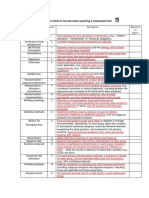0 ratings0% found this document useful (0 votes)
364 viewsEbp Chart With Defs
Uploaded by
api-265973793Copyright
© © All Rights Reserved
Available Formats
Download as PDF, TXT or read online on Scribd
0 ratings0% found this document useful (0 votes)
364 viewsEbp Chart With Defs
Uploaded by
api-265973793Copyright
© © All Rights Reserved
Available Formats
Download as PDF, TXT or read online on Scribd
You are on page 1/ 2
Overview of National Professional Developmental Center ASD 2014 Report on Evidence Based Practices (Tables 7-8)*
Full Report available at http://autismpdc.fpg.unc.edu/sites/autismpdc.fpg.unc.edu/files/2014-EBP-Report.pdf
* Adapted from: Wong, C., Odom, S. L., Hume, K. Cox, A. W., Fettig, A., Kucharczyk, S., Schultz, T. R. (2013). Evidence-based practices for children, youth, and young
adults with Autism Spectrum Disorder. Chapel Hill: The University of North Carolina, Frank Porter Graham Child Development Institute, Autism Evidence-Based
Practice Review Group.
Page 1 of 2
Evidence Based Practice and Abbreviated
Definition
Evidence by Developmental Domain and Age (years)
Social Comm. Beh. Joint
Attn.
Play Cog. School
Ready
Acad. Motor Adapt. Voc. Mental
Health
0
-
5
6
-
1
4
1
5
-
2
2
0
-
5
6
-
1
4
1
5
-
2
2
0
-
5
6
-
1
4
1
5
-
2
2
0
-
5
6
-
1
4
1
5
-
2
2
0
-
5
6
-
1
4
1
5
-
2
2
0
-
5
6
-
1
4
1
5
-
2
2
0
-
5
6
-
1
4
1
5
-
2
2
0
-
5
6
-
1
4
1
5
-
2
2
0
-
5
6
-
1
4
1
5
-
2
2
0
-
5
6
-
1
4
1
5
-
2
2
0
-
5
6
-
1
4
1
5
-
2
2
0
-
5
6
-
1
4
1
5
-
2
2
Antecedent Based Intervention (ABI): Arrangement of
events preceding an interfering behavior to prevent or
reduce occurrence
Cognitive Behavioral Intervention (CBI): Instruction
on cognitive processes leading to changes in behavior
Differential Reinforcement of Alternative,
Incompatible, or Other Behavior (DRA/I/O):
Consequences provided for desired behaviors that reduce
the occurrence of interfering behaviors
Discrete Trial Teaching (DTT): Instructional process of
repeated trials, consisting of instruction, response, and
consequence
Exercise (ECE): Antecedent based physical exertion to
reduce interfering behaviors or increase appropriate
behaviors
Extinction (EXT): Removal of existing reinforcement in
order to reduce an interfering behavior
Functional Behavior Assessment (FBA): Systematic
protocol designed to identify contingencies that maintain
an interfering behavior
Functional Communication Training (FCT):
Replacement of an interfering behavior with
communication that accomplishes the same function
Modeling (MD): Demonstration of a desired behavior
that results in skill acquisition through learner imitation
Naturalistic Intervention (NI): Intervention strategies
that occur with the learners typical settings and routines
Parent-Implemented Intervention (PII): Parent
delivered intervention learned through a structured parent
training program
Peer-Mediated Instruction and Intervention (PMII):
Typically developing peers are taught strategies that
increase social learning opportunities in natural
environments
Picture Exchange Communication System (PECS):
Systematic 6 phase protocol teaching the exchange of
pictures between communicative partners
Overview of National Professional Developmental Center ASD 2014 Report on Evidence Based Practices (Tables 7-8)*
Full Report available at http://autismpdc.fpg.unc.edu/sites/autismpdc.fpg.unc.edu/files/2014-EBP-Report.pdf
* Adapted from: Wong, C., Odom, S. L., Hume, K. Cox, A. W., Fettig, A., Kucharczyk, S., Schultz, T. R. (2013). Evidence-based practices for children, youth, and young
adults with Autism Spectrum Disorder. Chapel Hill: The University of North Carolina, Frank Porter Graham Child Development Institute, Autism Evidence-Based
Practice Review Group.
Page 2 of 2
Evidence Based Practice and Abbreviated
Definition
Evidence by Developmental Domain and Age (years)
Social Comm. Beh. Joint
Attn.
Play Cog. School
Ready
Acad. Motor Adapt. Voc. Mental
Health
0
-
5
6
-
1
4
1
5
-
2
2
0
-
5
6
-
1
4
1
5
-
2
2
0
-
5
6
-
1
4
1
5
-
2
2
0
-
5
6
-
1
4
1
5
-
2
2
0
-
5
6
-
1
4
1
5
-
2
2
0
-
5
6
-
1
4
1
5
-
2
2
0
-
5
6
-
1
4
1
5
-
2
2
0
-
5
6
-
1
4
1
5
-
2
2
0
-
5
6
-
1
4
1
5
-
2
2
0
-
5
6
-
1
4
1
5
-
2
2
0
-
5
6
-
1
4
1
5
-
2
2
0
-
5
6
-
1
4
1
5
-
2
2
Pivotal Response Training (PRT): Pivotal learning
variables guide intervention implemented in settings that
build on learner interests and initiative
Prompting (PP): Verbal, gestural, or physical assistance
that supports skill acquisition
Reinforcement (R+): A response occurring after a
behavior resulting in an increased likelihood of future
reoccurrence of the behavior
Response Interruption/Redirection (RIR): Use of
prompts or distracters during an interfering behavior that
diverts attention and reduces the behavior
Scripting (SC): A verbal or written model of a skill or
situation that is practiced before use in context
Self Management (SM): Instruction on discrimination
between appropriate and inappropriate behaviors and
accurate self-monitoring and rewarding of behaviors
Social Narratives (SN): Descriptions of social situations
with examples of appropriate responding
Social Skills Training (SST): Direct instruction on social
skills with rehearsal and feedback to increase positive peer
interaction.
Structured Play Group (SPG): Adult lead small group
activities that include typically developing peers and use
prompting to support performance
Task Analysis (TA): The process of breaking a skill into
small steps that are systematically chained together
Technology-Aided Instruction and Intervention
(TAII): Intervention using technology as a critical feature
Time Delay (TD): Delaying a prompt during a practice
opportunity in order to fade the use of prompts
Video Modeling (VM): A video recording of a targeted
skill that is viewed to assist in learning
Visual Support (VS): Visual display that supports
independent skill use.
You might also like
- Frequency and Interval Recording Interactive Activity0% (1)Frequency and Interval Recording Interactive Activity5 pages
- Duration and Latency Recording Interactive Activity0% (1)Duration and Latency Recording Interactive Activity5 pages
- Effects of Presession Pairing On Preference For Therapeutic ConditionsNo ratings yetEffects of Presession Pairing On Preference For Therapeutic Conditions6 pages
- Estimating Repetitions in Reserve For Resistance Exercise An Analysis of Factors Which Impact On Prediction Accuracy PDFNo ratings yetEstimating Repetitions in Reserve For Resistance Exercise An Analysis of Factors Which Impact On Prediction Accuracy PDF7 pages
- QASP-S Competency Standards: Domains A. Autism Spectrum Disorder Basics100% (1)QASP-S Competency Standards: Domains A. Autism Spectrum Disorder Basics3 pages
- Teaching Practitioners To Conduct Behavioral Skills Training: A Pyramidal Approach For Training Multiple Human Service StaffNo ratings yetTeaching Practitioners To Conduct Behavioral Skills Training: A Pyramidal Approach For Training Multiple Human Service Staff13 pages
- Download Full Nonlinear Contingency Analysis Going Beyond Cognition and Behavior in Clinical Practice 1st Edition T. V. Joe Layng PDF All Chapters100% (3)Download Full Nonlinear Contingency Analysis Going Beyond Cognition and Behavior in Clinical Practice 1st Edition T. V. Joe Layng PDF All Chapters40 pages
- Using Video Modeling To Increase Variation in TheNo ratings yetUsing Video Modeling To Increase Variation in The71 pages
- Case-Smith's Occupational Therapy for Children and Adolescents, 8e 8th Edition Jane Clifford O'Brien - The ebook in PDF and DOCX formats is ready for download100% (1)Case-Smith's Occupational Therapy for Children and Adolescents, 8e 8th Edition Jane Clifford O'Brien - The ebook in PDF and DOCX formats is ready for download50 pages
- Effectiveness of Functional Communication Training With and Without Extinction and Punishment: A Summary of 21 Inpatient CasesNo ratings yetEffectiveness of Functional Communication Training With and Without Extinction and Punishment: A Summary of 21 Inpatient Cases25 pages
- EFL FEAT NT FEB 2019 - Vincent Carbone 1No ratings yetEFL FEAT NT FEB 2019 - Vincent Carbone 1143 pages
- (Autism and Child Psychopathology Series) Michael Siller, Lindee Morgan - Handbook of Parent-Implemented Interventions for Very Young Children With Autism-Springer International Publishing (2018)No ratings yet(Autism and Child Psychopathology Series) Michael Siller, Lindee Morgan - Handbook of Parent-Implemented Interventions for Very Young Children With Autism-Springer International Publishing (2018)497 pages
- Evidence-Based Staff Training. A Guide For PractitionersNo ratings yetEvidence-Based Staff Training. A Guide For Practitioners10 pages
- Ages & Stages Questionnaires - Brazilian 2021No ratings yetAges & Stages Questionnaires - Brazilian 202113 pages
- Tier 3 Comprehensive Functional Behavior Assessment (FBA) GuideNo ratings yetTier 3 Comprehensive Functional Behavior Assessment (FBA) Guide43 pages
- Applied Behavior Analysis - How Does Applied Behavior Analysis (ABA) WorkNo ratings yetApplied Behavior Analysis - How Does Applied Behavior Analysis (ABA) Work2 pages
- K.US CDC Developmental Milestones ChecklistNo ratings yetK.US CDC Developmental Milestones Checklist20 pages
- Freddy-Jackson-Brown_-Sarah-Brown-When-Young-People-with-Intellectual-Disabilities-and-Autism-Hit-PuNo ratings yetFreddy-Jackson-Brown_-Sarah-Brown-When-Young-People-with-Intellectual-Disabilities-and-Autism-Hit-Pu180 pages
- Link To Publication in University of Groningen/UMCG Research Database100% (1)Link To Publication in University of Groningen/UMCG Research Database19 pages
- The Prospective and Retrospective Memory Questionnaire (PRMQ) : Normative Data and Latent Structure in A Large Non-Clinical SampleNo ratings yetThe Prospective and Retrospective Memory Questionnaire (PRMQ) : Normative Data and Latent Structure in A Large Non-Clinical Sample18 pages
- Review of The Self-Sacrifice Dimension of The Dimensional Clinical Personality Inventory50% (2)Review of The Self-Sacrifice Dimension of The Dimensional Clinical Personality Inventory8 pages
- FinalAccessibleIEPDevelopment-July 2020 Website LockedNo ratings yetFinalAccessibleIEPDevelopment-July 2020 Website Locked41 pages
- Pediatric Evaluation of Disability Inventory (PEDI) : SynonymsNo ratings yetPediatric Evaluation of Disability Inventory (PEDI) : Synonyms4 pages
- Functional Assessment Screening Tool (Fast) : Evaluator InformationNo ratings yetFunctional Assessment Screening Tool (Fast) : Evaluator Information2 pages
- Moore (2001) On Distinguishing Methodological Form Radical BehaviorismNo ratings yetMoore (2001) On Distinguishing Methodological Form Radical Behaviorism24 pages
- An Annotated Bibliography For Instructional Systems DevelopmentNo ratings yetAn Annotated Bibliography For Instructional Systems Development60 pages
- Occupational Therapy for Children and Adolescents (Case Review) 7th Editionpdf download100% (2)Occupational Therapy for Children and Adolescents (Case Review) 7th Editionpdf download51 pages
- Systematic Review Emotion Dysregulation and ChalleNo ratings yetSystematic Review Emotion Dysregulation and Challe24 pages
- Positive Behavioral Supports: By: Amanda JohnsonNo ratings yetPositive Behavioral Supports: By: Amanda Johnson12 pages
- FIELD STUDY Episode 4 TOOLS OF THE TRADENo ratings yetFIELD STUDY Episode 4 TOOLS OF THE TRADE5 pages
- NYT 19may2019 Why You Procrastinate (It Has Nothing To Do With Self-Control)100% (1)NYT 19may2019 Why You Procrastinate (It Has Nothing To Do With Self-Control)9 pages
- Stage 6 English Extension 2 Support Material Sample Assessment Task Literature ReviewNo ratings yetStage 6 English Extension 2 Support Material Sample Assessment Task Literature Review2 pages
- A. Computer Game Design (3) B. Hospitality (4) C. Marketing (1) D. Information Technology (5) E. Airline IndustryNo ratings yetA. Computer Game Design (3) B. Hospitality (4) C. Marketing (1) D. Information Technology (5) E. Airline Industry3 pages
- Theories of Instructional Management: PISMP 5.08No ratings yetTheories of Instructional Management: PISMP 5.0835 pages
- STUDENT COPY SCES1152 Computational Thinking in ScienceNo ratings yetSTUDENT COPY SCES1152 Computational Thinking in Science3 pages
- English Grammar FOR: Created by Rudi SinabaNo ratings yetEnglish Grammar FOR: Created by Rudi Sinaba16 pages
- Davontaes Post Observation Conference Record 1No ratings yetDavontaes Post Observation Conference Record 13 pages
- Pain and Motor Control of The Lumbopelvic Region, Effect and Possible MechanismsNo ratings yetPain and Motor Control of The Lumbopelvic Region, Effect and Possible Mechanisms10 pages
- THE STORY of The AGED MOTHER LP and Worksheets89% (9)THE STORY of The AGED MOTHER LP and Worksheets7 pages



































































































